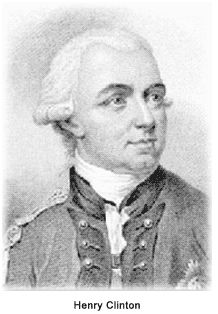 Henry Clinton was born in Newfoundland, the son of Admiral George Clinton, a noted British naval officer. Young Clinton spent most of his early years in New York, where his father served as colonial governor in the 1740s.
In 1751, Clinton received a commission in the British Army and later served in the Seven Years’ War, seeing action in Germany. A brief stint in Parliament was cut short by his wife's death, which led to Clinton’s temporary retirement from public life.
In 1775, Clinton was back in active military service and was assigned to North America, where he was second in command to Sir William Howe. He served at the Battle of Bunker Hill, but his later efforts to galvanize Loyalist forces in the South were unsuccessful. Clinton’s distinguished performance at Long Island resulted in a promotion to lieutenant general and knighthood.
When Howe undertook his campaign in Pennsylvania in 1777, Clinton assumed the command in New York City. His drive up the Hudson River resulted in early victories at Forts Clinton and Montgomery, his failure to reach John Burgoyne contributed to the pivotal British surrender at Saratoga in October.
In 1778, following a brief stay in England, Clinton returned to America as Howe’s replacement as commander-in-chief. British forces were withdrawn from Philadelphia and on their march toward New York City narrowly escaped disaster at Monmouth Court House in June. Clinton’s command was not a happy one; he resented the lack of support from London and tried unsuccessfully to resign.
Late 1779, Clinton took the offensive in New York by seizing Stony Brook and Verplanck’s Point. He later opened a new theater of operations in the South and captured Charleston in May 1780. Clinton then returned to New York, where an attack from Washington’s forces was anticipated. Despite an uneasy relationship, Clinton had turned over the reins to the Southern offensive to his second-in-command, Lord Charles Cornwallis, who was instructed to maintain possession of Charleston and Savannah at all costs.
Cornwallis’s offensive faltered in the late summer of 1781. Clinton’s rescue fleet with reinforcements from New York was too late to prevent the British surrender at Yorktown. Clinton resigned his command later that year and returned to England. The next years were frustrating as he contended with critics who blamed him for the American debacle and lauded Cornwallis. In 1783, Clinton published the Narrative of the Campaign of 1781, which heightened and personalized the rivalry.
Clinton gained some satisfaction late in life when he was reelected to Parliament, promoted to full general and named governor of Gibraltar.
Henry Clinton was born in Newfoundland, the son of Admiral George Clinton, a noted British naval officer. Young Clinton spent most of his early years in New York, where his father served as colonial governor in the 1740s.
In 1751, Clinton received a commission in the British Army and later served in the Seven Years’ War, seeing action in Germany. A brief stint in Parliament was cut short by his wife's death, which led to Clinton’s temporary retirement from public life.
In 1775, Clinton was back in active military service and was assigned to North America, where he was second in command to Sir William Howe. He served at the Battle of Bunker Hill, but his later efforts to galvanize Loyalist forces in the South were unsuccessful. Clinton’s distinguished performance at Long Island resulted in a promotion to lieutenant general and knighthood.
When Howe undertook his campaign in Pennsylvania in 1777, Clinton assumed the command in New York City. His drive up the Hudson River resulted in early victories at Forts Clinton and Montgomery, his failure to reach John Burgoyne contributed to the pivotal British surrender at Saratoga in October.
In 1778, following a brief stay in England, Clinton returned to America as Howe’s replacement as commander-in-chief. British forces were withdrawn from Philadelphia and on their march toward New York City narrowly escaped disaster at Monmouth Court House in June. Clinton’s command was not a happy one; he resented the lack of support from London and tried unsuccessfully to resign.
Late 1779, Clinton took the offensive in New York by seizing Stony Brook and Verplanck’s Point. He later opened a new theater of operations in the South and captured Charleston in May 1780. Clinton then returned to New York, where an attack from Washington’s forces was anticipated. Despite an uneasy relationship, Clinton had turned over the reins to the Southern offensive to his second-in-command, Lord Charles Cornwallis, who was instructed to maintain possession of Charleston and Savannah at all costs.
Cornwallis’s offensive faltered in the late summer of 1781. Clinton’s rescue fleet with reinforcements from New York was too late to prevent the British surrender at Yorktown. Clinton resigned his command later that year and returned to England. The next years were frustrating as he contended with critics who blamed him for the American debacle and lauded Cornwallis. In 1783, Clinton published the Narrative of the Campaign of 1781, which heightened and personalized the rivalry.
Clinton gained some satisfaction late in life when he was reelected to Parliament, promoted to full general and named governor of Gibraltar.